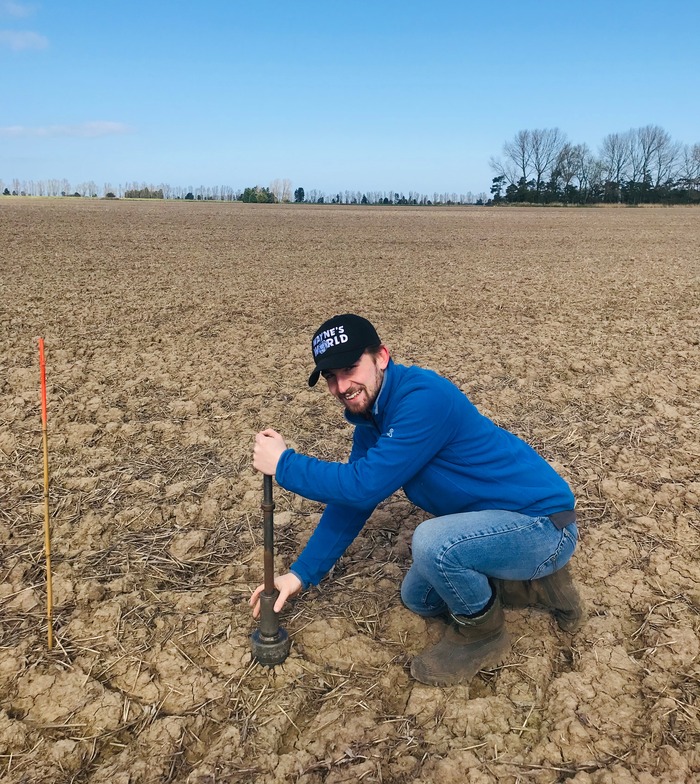Pictured: Sam Keenor
“Involvement in UEA’s postgraduate research has directly benefitted us commercially”
Steve Kilham, Managing Director of Greenworld Ltd
Greenworld Ltd is based in West Norfolk and offers a wide range of waste management services. Founded by Managing Director Steve Kilham in 2000, the company’s vision is to develop a sustainable environment for its employees, the community and wildlife in which it operates. One of the company’s products is paper-crumble, which is used to improve soil on farms. A by-product of paper recycling, paper-crumble was traditionally either incinerated or sent to landfill.
 Pictured: Sam Keenor
Pictured: Sam Keenor
Steve Kilham tells us:
“As a business, we wanted to develop a strong evidence-base on the benefits of using paper crumble to improve soil quality, as it was clear that this was a new area – so detailed academic work hadn’t been carried out. We contacted Professor Brian Reid, a leading expert in soil science from University of East Anglia (UEA), and he engaged in some consultancy work for us. This helped us to access external funding for UEA to carry out a pilot study on our farm into the effects of paper-crumble on soil. A team from UEA – including Sam Keenor, who was carrying out an integrated Masters degree on the subject – regularly took and analysed soil samples from one of the fields on our farm where we applied paper crumble over 2017/18.
“The pilot project was very successful, indicating that paper-crumble has the potential to significantly rejuvenate soil and benefit farmers; it also has the potential to help to combat climate change by replacing carbon in soil that has been lost over the years. So, this led to us receiving further external funding for UEA to carry out more extensive research, setting up a further field trials on our land and on another farm to look in more detail at the impact of treating different soil types with paper crumble. The funding (from a project supported by Research England) also enabled us to take on Sam on a 12 week internship, after he’d completed his Masters.
“It was clear that Sam was a very quick learner, and during his internship he carried out very useful working for us, looking at the impact of paper-crumble and other products on soil. After spending some further time working for us and UEA, Sam then gained a PhD Studentship* in 2020, so he could build on the research he’d carried out so far in looking at carbon capture with relation to soil. We became what’s known as a CASE partner of Sam’s PhD, which means that we provide some funding for Sam’s PhD, and he spends three months with us, working on areas that are related to his studies – so the arrangement is mutually beneficial. As part of his PhD, Sam also regularly takes samples for the ongoing field samples on our land, so his findings are particularly useful for us a business.
“Sam’s work for us during his PhD has directly benefitted us commercially. He led on gaining approval from the Environment Agency for increasing the amount of our paper crumble product that may be distributed per hectare. Previously, the limit was for 50 tonnes of our paper crumble to be deployed per hectare; now, we’ve gained approval for deployment of up to 65 tonnes of paper crumble per hectare, thanks to Sam’s work in demonstrating the benefits of doing so. This benefits our customers as it maximises the improvements to their soil by using paper crumble. It also has environmental benefits through further increasing the carbon content of soil and enabling us to distribute more of our product to local farmers, reducing road haulage impact on the local community, as well as our administration and licensing costs.
“Involvement in UEA’s postgraduate programme has given me access to someone who really understands my business and the wider market from an academic perspective. This is extremely useful for testing out new innovations and ideas. Our links with UEA’s have given us a strong evidence-base on the benefits of paper-crumble, allowing us to show customers how repetitive use of this product will improve soil quality while capturing carbon. It has been invaluable to quantify this through leading research and independent review.”
*Sam’s PhD studentship is supported by the ARIES Doctoral Training Partnership, with funding from Natural Environment Research Council [grant number NE/S007334/1].
:focus(571x200:572x201))